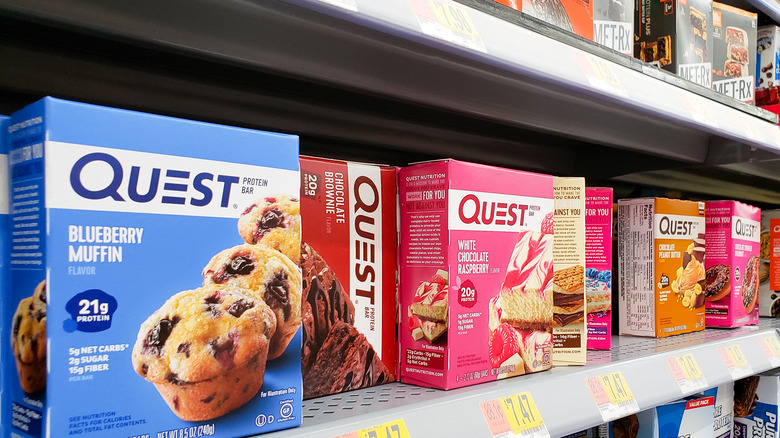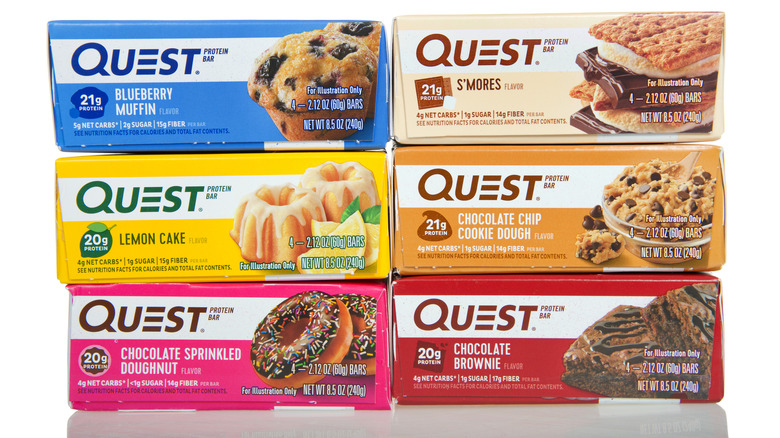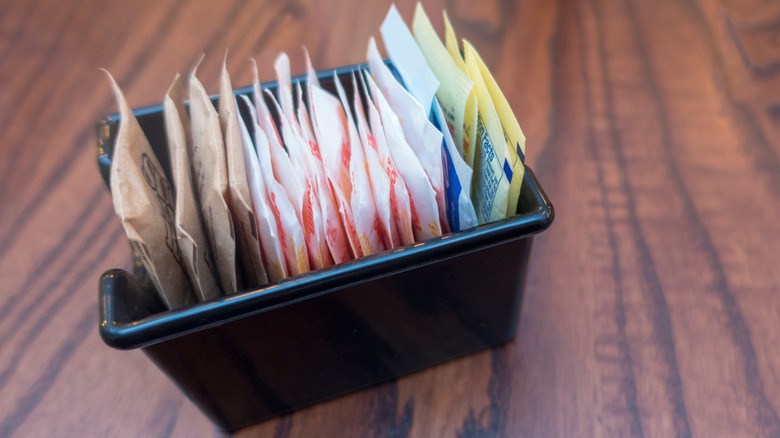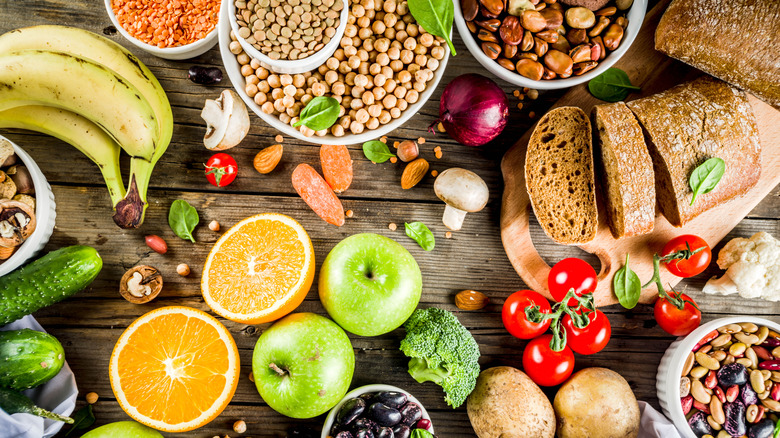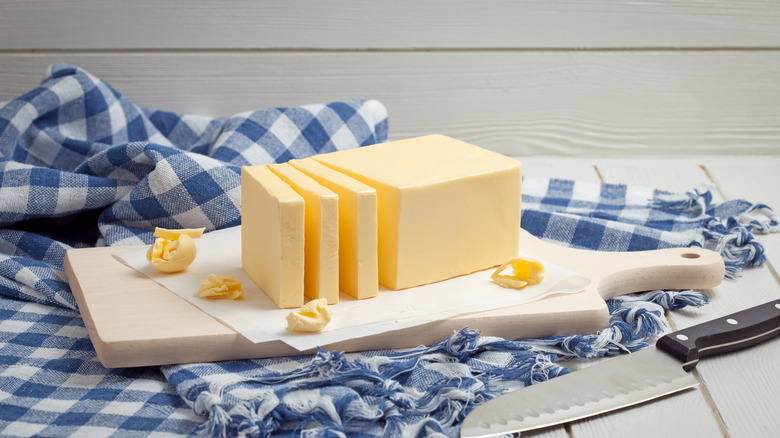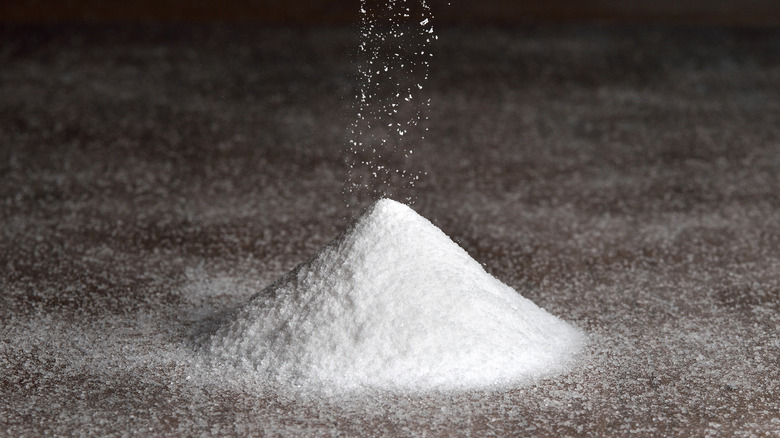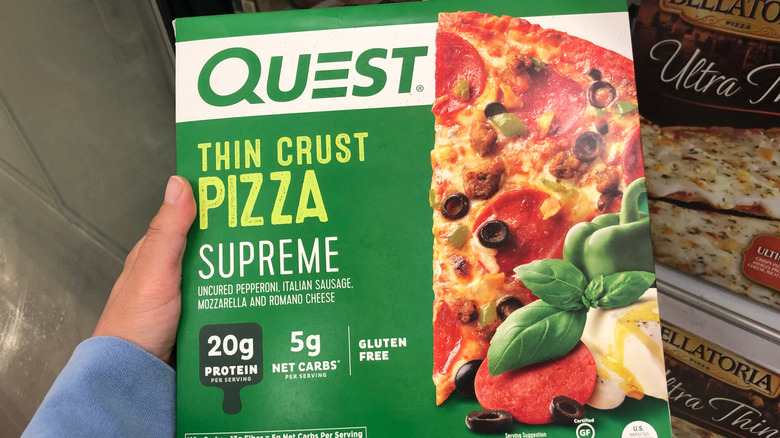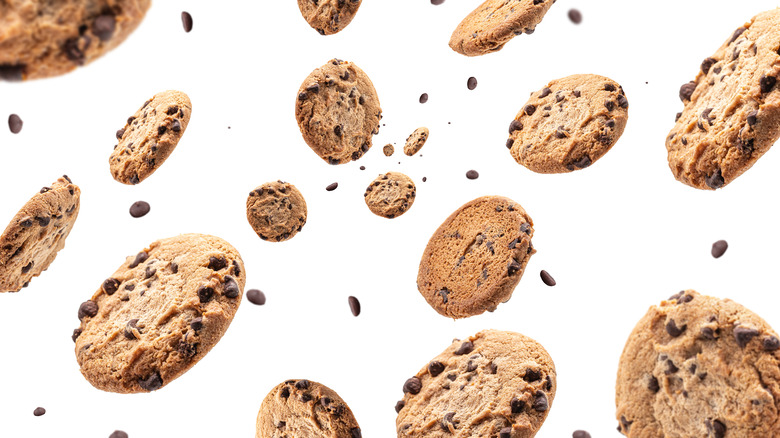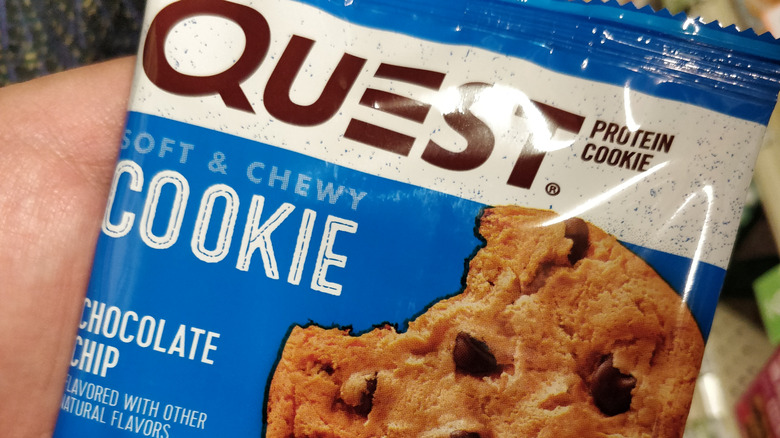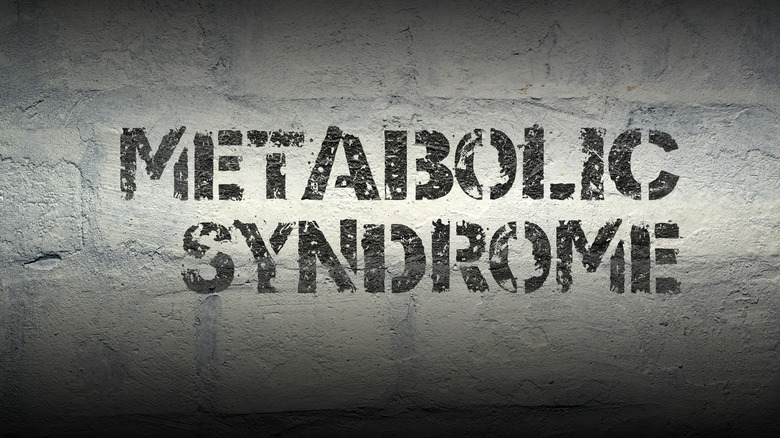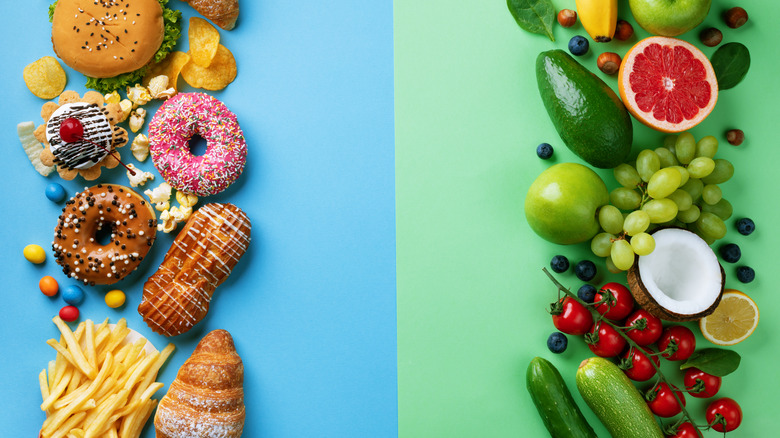The Truth About Quest Nutrition
Quest Nutrition, a top producer of health food products, is probably best known for its popular protein bars. These come in lots of yummy-sounding flavors: Chocolate Peanut Butter, Birthday Cake, and Cookies & Cream. The company also offers a range of other high-protein products, including shakes, powders, cookies, candies, chips, and even frozen pizza (via Quest Nutrition). And you won't have any trouble finding them — Quest products are widely available online and in natural, grocery, and mass-market stores across the country. According to Dun & Bradstreet, Quest Nutrition's annual revenue tops $62 million.
Although Quest products are marketed as a health-food item, some have questioned whether they are actually healthy (including Spoon University). Of course, this begs the question: What constitutes a "healthy" protein bar? Kristin Kirkpatrick, who manages nutrition services for the Cleveland Clinic Wellness Institute, suggests looking for the following nutritional elements: calories (100 to 200 as a snack, 300 for a meal replacement), protein (at least 15 grams, but 20 grams is ideal), and carbs (no more than 1.5x as many carbs as protein), according to Women's Health. But how do Quest Nutrition products stack up? Read on to discover the truth.
Most Quest Nutrition products offer a lot of protein
Eating enough protein is vital for good health. According to MedlinePlus, "You need protein in your diet to help your body repair cells and make new ones." Although the exact amount of protein in each of Quest Nutrition's products varies, most of their protein bars deliver 20 to 21 grams (via Quest Nutrition). Some products, including Fudgey Brownie Candy Bites, contain only 5 grams. To estimate your body's daily protein needs, multiply your weight by 0.36 (via Harvard Health).
Quest products contain whey protein isolate and milk protein isolate, which some nutritionists and wellness bloggers take issue with. According to Spoon University, these highly-processed protein sources are by-products of factory cheese production, as opposed to coming from whole protein sources like meat, milk, fish, and eggs. But Medical News Today reported that whey protein isolate may help promote lean muscle mass, weight loss, and lower cholesterol levels. At high levels of consumption, potential dangers include nausea and headaches. Whey protein isolate may also cause stomach pain, cramps, and fatigue.
As for milk protein isolate, Healthline stated, "Milk protein isolate is an excellent source of protein and contains all the essential amino acids your body needs. It's also a good source of branched-chain amino acids, such as leucine, which are important for muscle growth and recovery." That said, eating too much milk protein isolate may lead to digestive issues, and it is not appropriate for those with dairy allergies or who are lactose intolerant.
Quest bars contain artificial sweeteners
If you find Quest bars oh-so sweet and satisfying, you may be wondering how they only contain a single gram of sugar. Product ingredient lists reveal the inclusion of three different sugar substitutes: sucralose (marketed as Splenda), stevia, and erythritol (via Quest Nutrition). But don't panic, because according to the Mayo Clinic, artificial sweeteners may offer some benefits over sugar. For example, they don't contribute to tooth decay, and can help with weight loss and diabetes management. But artificial sweeteners have been criticized for decades as being potentially harmful.
Healthline takes a deeper dive into sucralose, suggesting that while authorities have deemed it safe, some studies have suggested otherwise. Research on rat gut health found sucralose to be problematic, but human studies are needed to draw conclusions. The purified form of stevia is also FDA-approved (though whole leaf stevia is not) per WebMD. Unlike sucralose, stevia is a natural sweetener. It contains no calories, carbohydrates, or artificial ingredients. The catch is some people don't care for the way it tastes. Meanwhile, erythritol (a sugar alcohol), may sound a little too good to be true, according to Healthline. Erythritol tastes a lot like sugar, contains almost no calories, does not spike blood sugar or insulin, and is considered very safe. Unfortunately, it can lead to digestive issues in some people.
Bottom line: When it comes to sugar substitutes, moderation is key. For this (and other reasons), you should probably avoid gorging yourself on Quest Nutrition products.
Quest products add fiber
High-fiber diets can help protect against some diseases, including diabetes, heart disease, and certain types of cancer (via NPR). Plus, eating enough fiber can lower blood pressure, blood sugar, and cholesterol levels, along with aiding digestion and bowel function. Women should aim to consume at least 21 to 25 grams of fiber a day; men, 30 to 38 grams (via the Mayo Clinic). Some dietitians suggest getting your fiber from natural sources (such as an apple) vs. processed foods (like Quest bars) is important. But there are also those in the food industry who believe that since most people don't get enough fiber, supplementation with snack bars can help them meet their nutritional needs.
Quest Nutrition now adds in soluble corn fiber to their protein bars, which results in 13 to 17 grams of fiber per serving. Previously, the company used isomalto-oligosaccharides (IMO) as a fiber source. This was referred to as a "fraudulent fiber" in a Kion blog that encouraged people to choose more natural sources. Although it is possible that soluble corn fiber may offer some benefits, it has mostly been associated with highly processed foods which have been linked to major health issues like heart disease, cancer, and diabetes (via Healthline). To be fair, Quest bars lack high amounts of sugar, sodium, and other problematic ingredients found in many junk foods. According to Healthline, some high-fiber sources that you should be eating include fresh fruits and vegetables, beans and legumes, and whole grains.
If you wish to avoid saturated fats, you may want to put down that Quest bar
Pretty much everyone agrees that saturated fats (and trans fats) are not healthy and should be avoided. In the Dietary Guidelines for Americans, you're encouraged to limit saturated fats in order to boost your health. These fats, generally solid at room temperature, can be found in meats, dairy, butter, margarine, tropical oils (like coconut and palm kernel), cakes, cookies, and many snack foods. If you are trying to avoid saturated fats entirely, you probably shouldn't eat Quest bars. They contain 2 to 3 grams of saturated fat each, depending on the flavor. For perspective, a 12-ounce steak contains a heart-stopping 20 grams.
According to MedicinePlus, you should limit saturated fat intake to less than 10% of your daily calories: "For a 2,000 calorie diet, that is 140 to 200 calories or 16 to 22 grams (g) of saturated fats a day." With this in mind, it's probably okay for most people to eat Quest Nutrition products on occasion. However, a better option would be to eat healthy, unsaturated fats daily from foods like seafood, nuts, seeds, olive oil, canola oil, and avocado.
Processed foods like Quest Nutrition products contain high levels of sodium
You probably know that consuming too much sodium can lead to health problems. The American Heart Association recommends "no more than 2,300 milligrams (mgs) a day and an ideal limit of no more than 1,500 mg per day for most adults, especially for those with high blood pressure. Even cutting back by 1,000 mg a day can improve blood pressure and heart health." If you're regularly eating Quest Nutrition protein bars, you should be aware that they contain between 200 and 280 milligrams of sodium, which is a fairly solid chunk of your daily allotment.
Instead of reaching for a Quest bar or other packaged, processed foods, the Centers for Disease Control and Prevention (CDC) suggests taking steps to reduce your sodium intake. At the grocery store, select fresh fruits and vegetables, read nutrition labels to find low or reduced-sodium products, and avoid cured, salted, smoked, or other processed meats. At home, use salt-free seasonings and spices, prepare foods from their most basic forms, and avoid packaged products like sauces, mixes, and "instant" meals. When dining out, request the menu's nutritional information so that you can make an informed decision on what to order.
Eating Quest bars can lead to bloating and other digestive problems
Have you ever noticed stomach problems after eating Quest Nutrition products? Colleen Tewksbury, from Penn Medicine, discusses why some protein bars may leave you feeling "crampy, farty, and bloated" (via Self). She explained, "A lot of these bars with a health angle can have ingredients that can cause people [GI] distress." Problematic ingredients often include added fiber and sugar alcohols. This appears to be the case with Quest bars, since they contain soluble corn fiber (added fiber) and erythritol, which is a sugar alcohol (via Quest Nutrition).
On a related topic, Healthline posted an entire article about "protein farts" (thanks for that!). Apparently, flatulence is common after eating products containing whey protein, which Quest Nutrition products contain. Additionally, products with whey protein often contain a lot of lactose, which can also impact the digestive tract. When consumed in large amounts, even people who are not typically sensitive to lactose may experience a rather gassy reaction.
Quest bar flavors are based on desserts
Let's face it, the truth about Quest Nutrition isn't all bad. If you're trying to avoid eating cookies, brownies, cakes, and other junk foods, perhaps reaching for a Quest product could satisfy your cravings with minimal sugar and carbs — along with an added protein boost. If you're interested in giving it a try, Predator Nutrition ranks the best Quest bar flavors, with top picks being Cookies & Cream, Chocolate Chip Cookie Dough, and Chocolate Sprinkled Donut. And Quest Nutrition shares their best-selling products: Chocolate Chip Cookie Dough, Birthday Cake, and Chocolate Chip protein bars.
But if you're looking to cure your sweet tooth or curb your appetite in general, is reaching for a dessert-themed snack bar the best idea? Perhaps not. A 2021 study in JAMA studied the effects of the artificial sweetener sucralose on appetite. Researchers found that women and people with obesity — especially women with obesity — who consume sucralose may actually be more sensitive to food cravings afterward. In other words, if you fall into one or both of these populations, it may be best to avoid sucralose altogether. Instead of choosing artificially-sweetened foods, Colgate offers a number of healthy alternatives to help satisfy your sweet tooth. These include fruit, Greek yogurt, peanut butter and bananas, and chia pudding. Fortunately, that all sounds pretty tasty, too!
Quest bars are gluten-free
If you follow a gluten-free diet, the good news is that Quest bars are gluten-free. But we also want you to know that even though following a gluten-free diet has become increasingly trendy, it isn't necessary for most people to do so. If you're wondering what eating gluten-free even means, the Mayo Clinic explains, "To follow a gluten-free diet, you must avoid wheat and some other grains while choosing substitutes that provide nutrients for a healthy diet." Some health conditions that may benefit from such a diet include celiac disease, non-celiac gluten sensitivity, gluten ataxia, and wheat allergy.
If you do not have one of these conditions, there are plenty of reasons for you not to go gluten-free (via Providence Health & Services). First of all, carbohydrates, where gluten can be found, should account for 55-65% of a healthy diet. So if you're trying to eat healthier, you'll actually want to hang onto your healthy carbs, such as whole grains. Despite what you may have heard, going gluten-free is also unlikely to aid weight loss. While cutting an entire food group (i.e. grains) may initially lead to weight loss, there are healthier, more sustainable ways to lose weight. Finally, we don't want you to follow a gluten-free diet in the hopes of self-diagnosing celiac disease. If you believe you may be suffering from a medical condition, talk to your doctor about appropriate next steps.
Quest Nutrition makes pizza
Looking for a Friday night pizza fix? Move over, DiGiorno. Quest Nutrition now offers a thin-crust frozen pizza option with high protein and low carbs (via Quest Nutrition). The company sells four savory flavors: 4-Cheese, Supreme, Uncured Pepperoni, and Meat Lover's. Nutrition facts boast 20 to 28 grams protein and 5 to 6 grams carbohydrates per serving, depending on which type you choose.
Women's Health Magazine includes Quest Nutrition thin-crust pizza on their list of "The 12 Healthiest Frozen Pizzas You Can Buy, According to Nutritionists." It is identified as a keto-friendly, extra high-protein option and described by dietician Lauren Harris-Pincus as "crazy high in protein and fiber, but low in net carbs." But if you're anything like us, what you really want to know is: Does it taste good? Although somewhat different from regular pizza, video health blogger Kathleen Hart provides a favorable review in a product taste test on her YouTube channel lil Piece of Hart.
You can bake Quest bars
Okay, this one is pretty cool and unexpected. If you must have cookies, but wish to avoid flour, sugar, carbohydrates, butter, excessive calories (and all that fun stuff), we've got you covered with this high-protein, low-sugar baking hack. Plus, it may also help those who really want to like Quest bars — but just don't. Despite plenty of online claims, we were nonetheless surprised that baking them completely changes the texture and instead creates warm, gooey deliciousness (yes, we tried it!).
Protein Cakery provides detailed instructions on how to bake a Quest protein bar: Heat the oven to 325 degrees Fahrenheit, cut the bar into eight pieces, place pieces onto a parchment-lined baking sheet, bake for three to five minutes until they are puffy, flatten with a spatula, then bake three more minutes. Let cool, then enjoy. And that's not all! How about slathering a baked Double Chocolate Chunk Quest bar with peanut butter, or making healthier Cookie Crisp cereal to eat with greek yogurt and almond milk for breakfast (via Spoon University)? Other food and health blogs, such as Bon Appétit, mention Quest poptarts, pancakes, and even mug cakes. But if baking your own Quest cookies sounds like too much work, you can always opt to buy the packaged version.
There are two types of Quest Nutrition cookie products
Instead of baking your own Quest cookies from one of their protein bars, Quest Nutrition offers two pre-packaged cookie products: Quest Protein Cookies and Quest Frosted Cookies. Quest Protein Cookies offer 15 grams of protein and less than 1 gram of sugar (via Quest Nutrition). They come in five appealing flavors, including Chocolate Chip, Double Chocolate Chip, Peanut Butter, Peanut Butter Chocolate Chip, and Snickerdoodle. Alternatively, Quest Frosted Cookies offer 5 grams of protein and less than 1 gram of sugar (via Quest Nutrition). This type comes in two flavors: Frosted Cookie Chocolate Cake and Frosted Cookie Birthday Cake.
Compared to traditional store-bought cookies, either option seems like a nutritional deal. For example, two Chips Ahoy cookies contain only 2 grams of protein and a full 9 grams of sugar, according to Carb Manager. So if you're looking for a baked treat, you could certainly do worse than indulging in a Quest cookie. But there are also healthier options.
Ingredients have changed over time
Since its inception, Quest Nutrition has aimed toward the lofty goal of ending metabolic diseases. These include conditions like obesity, high blood pressure, and high cholesterol that increase your risk for heart attack, stroke, and type 2 diabetes (via the Mayo Clinic). Quest Nutrition co-founder Tom Bilyeu told Bon Appétit, "All our products are designed from the standpoint of how they impact your blood panel." While this has always meant no added sugars, Bilyeu also explained that he wanted to create food that tasted good.
According to the same article, Instagram helped fuel a connection between the fitness world (particularly weight-lifters) and Quest bars. But while many fitness enthusiasts love the nutrition label on Quest Nutrition products, some wellness experts don't appreciate the inclusion of highly-processed ingredients like sucralose and whey protein. Despite this criticism, these ingredients remain.
Quest Nutrition changed fiber sources from isomalto-oligosaccharides (IMO) to soluble corn fiber after a study showed that IMOs didn't actually function as a fiber, instead being absorbed into the small intestine (via ScienceDirect). The ingredient change, quickly detected by Quest bar fans, impacted both taste and texture and led to market backlash. Quest Nutrition learned their lesson and soon bounced back as an industry leader.
They may not be the best snacks for everyone, but you could certainly do worse
From a clean eating point of view, we understand that Quest Nutrition products may not be right for everyone. Despite being high in protein and low in sugar and carbs, they do contain highly processed ingredients that you may prefer to avoid. However, keep in mind that while it is generally best to choose whole, natural foods, the reality is that there are plenty of worse things to eat.
On that note, Eat This, Not That! ranks the worst snacks in America. Topping the list are Entenmann's glazed donut holes, Hostess Snoballs, and Oreo cookies — so definitely stay away from those dietary nightmares. Instead, Self recommends a number of healthy snacks that you can and should keep at your desk, such as sunflower seeds, dried fruit, and almonds.
In terms of protein bars, Everyday Health determined that Quest bars "may be the best protein bar for athletes." Other top options include Pure Protein, Power Crunch, and Detour bars. Good Housekeeping also ranks the best protein bars, according to a nutritionist. Some of their top picks include Aloha, Kind Protein, Oatmega and RXBar. Quest bars are not on the list.
Quest Nutrition products should not replace whole foods
The truth about Quest Nutrition is that while their products might make for a reasonable snack or occasional replacement meal, they should not be used to replace healthy, whole foods. If you're wondering what makes whole foods so important, Tara Gidus, spokesperson for the American Dietetic Association, explained, "When you eat whole foods, you're getting the food in its natural state. You're getting it intact, with all of the vitamins, minerals, and other nutrients that are in the food" (via Nourish by WebMD). Along with being chock-full of fiber, vitamins, minerals, and other essential nutrients that your body needs to function properly, whole foods can also help prevent serious health conditions like cardiovascular disease, some types of cancer, and type 2 diabetes.
There are plenty of additional reasons to eat whole foods, according to Healthline. Whole foods are generally low in sugar, better for the environment, and good for your skin. Plus, they may help prevent overeating, while tasting delicious.
